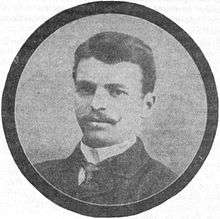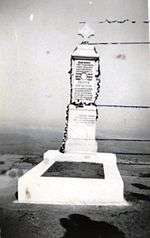Georgi Sugarev
Georgi Kostov Sugarev (Bulgarian: Георги Костов Сугарев) was a Macedonian Bulgarian revolutionary, vojvoda of the Internal Macedonian-Adrianople Revolutionary Organization.[1][2][3] Despite the Bulgarian national identification of the late Ottoman Macedonia Slavic revolutionaries,[4][5][6] and most of the local Slavic population then,[7][8][9] in North Macedonia they, including Sugarev,[10] are added to the country's historical heritage as ethnic Macedonians.[11][12]

Sugarev was born in 1876 in Bitola, then in the Ottoman Empire, today in North Macedonia. His family was very poor and his mother together with his brothers Hristo, Mihail and Vangel emigrated to the United States and actively participate in the activities of the Macedonian Patriotic Organization. Vangel became there a historian and author of several books as "The Bulgarian nationality of the Macedonians"[13] and "The constitution of the Bulgarian revolutionary central committee".[14]
Sugarev completed fourth grade of Bulgarian Men's High School of Bitola. Afterwards he became a Bulgarian teacher initially in Demir Hisar, then in Kichevo, and finally in Bitola. However he left the school system and decided to join the Internal Macedonian Revolutionary Organisation. In 1901 he became a chetnik of Nikola Rusinski. With the assistance of the vojvoda Rusinski, they operated together through the regions of Demir Hisar, Smilevo and Bitola. The same year he was elected a member of the Bitola District Revolutionary Committee of the IMRO, and in February 1902 he went underground. Sugarev was a delegate to the Smilevo Congress of the Bitola revolutionary district of IMRO. At the beginning of the Ilinden uprising he was Bitola revolutionary district leader, participating in several battles. Together with the vojvodas Hristo Uzunov he supported Dame Gruev to restore the organization after the suppression of the uprising. Sugarev participate in the Prilep Congress of the IMRO in 1904. He started also anti-Serb campaign in the late summer of 1905. Thеse actions he coordinated with the IMRO leaders Pancho Konstantinov and Ivan Naumov Alyabaka. Later Sugarev left for Bitola to arrange joint actions against the pro-Serbian bands in the Bitola and Skopje revolutionary districts. By this activity Sugarev was helped by the Bulgarian vojvodas Petar Yurukov and Petar Radev.

In March 1906 Sugarev travelled to Mariovo to counter the intensifying Greek bands. Because of betrayal, of March 23, 1906 the cheta was surrounded near the village of Paralevo of numerous Turkish forces and after a fierce battle was completely destroyed.
During the Second World War, when the area was under Bulgarian administration, the authorities built a tombstone of Sugarev on his place of a skull, that after the war was destroyed by the Yugoslav administration.
References
- Николов, Борис Й. Вътрешна македоно-одринска революционна организация. Войводи и ръководители (1893-1934). Биографично-библиографски справочник, София, 2001, стр. 161-162.
- Сониксен, Алберт. Изповедта на един македонски четник, Трето издание, София, 1983, Изд. на Отечествения фронт, стр.63.
- Спомени от моето минало, глава 18, Тома Николов, Изд. на Отеч. фронт, София, 1989.
- Contrary to the assertions of Skopje's historiography, Macedonian revolutionaries clearly manifested Bulgarian national identity. Their Macedonian autonomism and “separatism” represented a strictly supranational project, not national. Entangled Histories of the Balkans:, Roumen Dontchev Daskalov, Tchavdar Marinov, BRILL, 2013, p. 303., ISBN 900425076X
- "The turn-of-the-century Internal Macedonian Revolutionary Organization (IMRO), was actually a largely pro-Bulgarian organization but is claimed today as the founding Macedonian national movement." Modern Hatreds: The Symbolic Politics of Ethnic War, Stuart J. Kaufman, Cornell University Press, 2001, ISBN 0801487366, p. 193.
- "Уште робуваме на старите поделби", Разговор со д-р Зоран Тодоровски, директор на Државниот архив на Република Македониja (in Macedonian; in English: "We are still in servitude to the old divisions", interview with PhD Zoran Todorovski, Director of the State Archive of the Republic of Macedonia, published on , 27. 06. 2005. Трибуна: Дел од јавноста и некои Ваши колеги историчари Ве обвинуваат дека промовирате зборник за човек (Тодор Александров) кој се чувствувал како Бугарин. Кој наш револуционерен деец му противречел на Александров по тоа прашање? Тодоровски - Речиси никој. Уште робуваме на поделбата на леви и десни. Во етничка, во национална смисла сите биле со исти сознанија, со иста свест. In English: Tribune: Part of the public and some from your fellow historians accuse you of promotining a collection for man (Todor Alexandrov) who felt himself as Bulgarian. Are there some of our revolutionary activist who opposed him on that issue? Todorovski - Almost none. We are still in servitude to the old divisions of left and right. Ethnically, in a national sense, they were all with the same sentiments, with the same (Bulgarian) consciousness.
- During the 20th century, Slavo-Macedonian national feeling has shifted. At the beginning of the 20th century, Slavic patriots in Macedonia felt a strong attachment to Macedonia as a multi-ethnic homeland. They imagined a Macedonian community uniting themselves with non-Slavic Macedonians... Most of these Macedonian Slavs also saw themselves as Bulgarians. By the middle of the 20th. century, however Macedonian patriots began to see Macedonian and Bulgarian loyalties as mutually exclusive. Regional Macedonian nationalism had become ethnic Macedonian nationalism... This transformation shows that the content of collective loyalties can shift. Region, Regional Identity and Regionalism in Southeastern Europe, Ethnologia Balkanica Series, Klaus Roth, Ulf Brunnbauer, LIT Verlag Münster, 2010, ISBN 3825813878, p. 127.
- Up until the early 20th century, the international community viewed Macedonians as regional variety of Bulgarians, i.e. Western Bulgarians. Nationalism and Territory: Constructing Group Identity in Southeastern Europe, Geographical perspectives on the human past : Europe: Current Events, George W. White, Rowman & Littlefield, 2000, ISBN 0847698092, p. 236.
- At the end of the WWI there were very few historians or ethnographers, who claimed that a separate Macedonian nation existed... Of those Slavs who had developed some sense of national identity then, the majority probably considered themselves to be Bulgarians, although they were aware of differences between themselves and the inhabitants of Bulgaria... The question as of whether a Macedonian nation actually existed in the 1940s when a Communist Yugoslavia decided to recognize one is difficult to answer. Some observers argue that even at this time it was doubtful whether the Slavs from Macedonia considered themselves to be a nationality separate from the Bulgarians. The Macedonian conflict: ethnic nationalism in a transnational world, Loring M. Danforth, Princeton University Press, 1997, ISBN 0-691-04356-6, pp. 65-66.
- Istorija na makedonskiot narod, Aleksandar Stojanovski, Krste Bitovski, Institut za Nacionalna Istoriĵa, 2003, ISBN 9989624763, str. 300.
- Ideologies and National Identities: The Case of Twentieth-century Southeastern Europe, John R. Lampe, Mark Mazower, Central European University Press, 2004, ISBN 9639241822, p. 120.
- Yugoslavia: a concise history, Leslie Benson, Palgrave Macmillan, 2001, ISBN 0333792416, p. 89.
- The Bulgarian nationality of the Macedonians, Author: Vangel Konstantine Sugarev, Publisher: Worcester, Mass, 1919.
- The constitution of the Bulgarian revolutionary central committee, Author: Vangel Konstantine Sugarev; Publisher: Chicago, 1932.